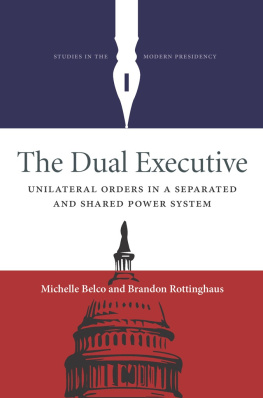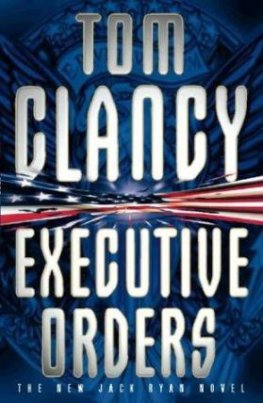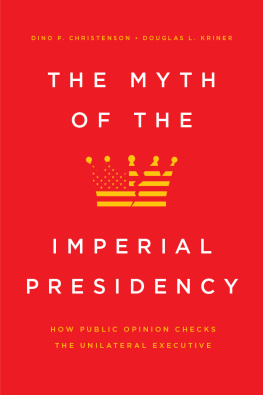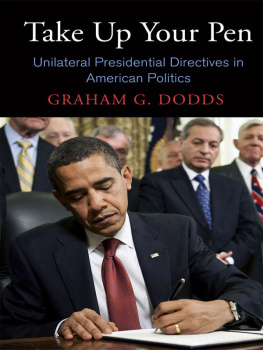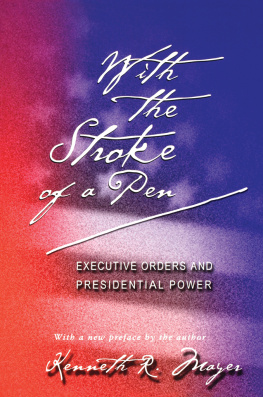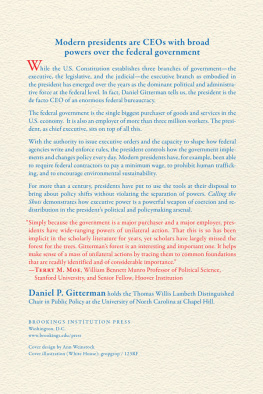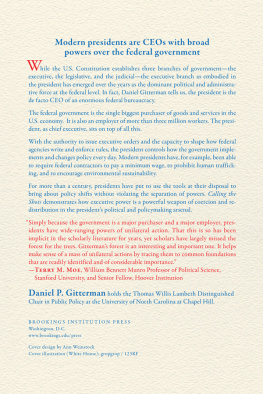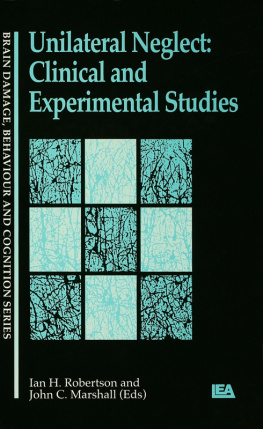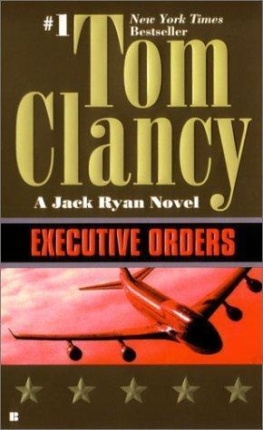Stanford University Press
Stanford, California
2017 by the Board of Trustees of the Leland Stanford Junior
University. All rights reserved.
No part of this book may be reproduced or transmitted in any form or by any means, electronic or mechanical, including photocopying and recording, or in any information storage or retrieval system without the prior written permission of Stanford University Press.
Printed in the United States of America on acid-free, archival-quality paper
Library of Congress Cataloging-in-Publication Data
Names: Belco, Michelle, author. | Rottinghaus, Brandon, author.
Title: The dual executive : unilateral orders in a separated and shared power system / Michelle Belco and Brandon Rottinghaus.
Other titles: Studies in the modern presidency.
Description: Stanford, California : Stanford University Press, 2017. | Series: Studies in the modern presidency | Includes bibliographical references and index.
Identifiers: LCCN 2016051758 (print) | LCCN 2016052930 (ebook) | ISBN 9780804799973 (cloth : alk. paper) | ISBN 9781503601987 (e-book)
Subjects: LCSH: Executive powerUnited States. | Presidents
United States. | Executive ordersUnited States. | Separation of powersUnited States.
Classification: LCC JK516 .B397 2017 (print) | LCC JK516 (ebook) | DDC 352.23/50973dc23
LC record available at https://lccn.loc.gov/2016051758
Typeset by Thompson Type in 10/15 Sabon
THE DUAL EXECUTIVE
UNILATERAL ORDERS IN A SEPARATED AND SHARED POWER SYSTEM
Michelle Belco and Brandon Rottinghaus
STANFORD UNIVERSITY PRESS
Stanford, California
STUDIES IN THE MODERN PRESIDENCY
A series edited by Shirley Anne Warshaw
Studies in the Modern Presidency is an innovative book series that brings together established and emerging voices in modern presidential research, from the Nixon administration to the present. While works on the modern Congress abound, this series seeks to expand the literature available on the presidency and the executive branch.
Scholars and journalists alike are increasingly writing and reporting on issues such as presidential rhetoric, executive-legislative relations, executive privilege, signing statements, and so on. We are committed to publishing outstanding research and analysis that reaches beyond conventional approaches to provide scholars, students, and the general public with insightful investigations into presidential politics and power.
This series features short and incisive books that chart new territory, offer a range of perspectives, and frame the intellectual debate on the modern presidency.
A list of the books in this series can be found online at http://www.sup.org/modernpresidency.
To Bea and Dan, who joyfully issue orders they expect others to obey.
M. B.
To B. J. and Ben, on whom no unilateral order would work.
B. R.
Contents
List of Tables
List of Figures
Acknowledgments
THE SUBJECT OF THIS BOOK speaks to an important function of the presidency and a topic of current, heated debatethe use and abuse of unilateral powers. Whether the president is an emperor or a clerk is the subject of both academic and legal concern. We make the argument that presidents are a bit of both, serving in dual roles as both agenda setters and facilitators of the smooth function of government.
This project originally grew out of seminar discussions at the University of Houston and blossomed into a full-scale research project over the course of several years. Its creation, like all book projects, has been both tedious and rewarding. But after all the laboring in the vineyards, the book is a darn sight better for all the hard work.
But we couldnt have done it alone. Archivists at the National Archives at College Park, Maryland, and the George W. Bush, Carter, and Clinton Presidential Libraries were helpful in tracking internal White House discussion about unilateral orders. Presentations at Texas A&M University, Clemson University, Washington University in St. Louis, and the University of Georgia helped to sharpen and clarify our arguments. Special thanks to colleagues Jeff Cohen, Jim Pfiffner, Will Howell, Andy Rudalevige, Terry Moe, Adam Warber, Jeff Peake, Jeremy Bailey, and Jon Rogowski for constructive criticism and suggestions over the course of the project. Our most gracious thanks, however, are reserved for series editor and friend Shirley Anne Warshaw for her early championing of our project and her tireless efforts to revise and hone the manuscript. If it werent for her, we would still no doubt be working on the book! Everyone at Stanford University Press has been a real joy to work with, especially editors Geoffrey Burn and Alan Harvey. Any errors are clearly our own. Portions of appeared in an article in Political Research Quarterly, In Lieu of Legislation: Executive Unilateral Preemption or Support During the Legislative Process in 2014 (Issue 67).
Michelle Belco would like to thank Gaby Briones and Zachary Brown for their tireless efforts.
Brandon Rottinghaus would also like to acknowledge the financial support of the University of Houston, National Endowment for the Humanities Research Fellowship and the National Science Foundation (SES # 1237627).
CHAPTER ONE
Introduction
The Dual Executive and Unilateral Power
UNILATERAL ACTION IS OFTEN TREATED as an aggressive intrusion into the political system, with presidents issuing unilateral orders at their discretion in pursuit of their own policy goals. The use of unilateral orders as a powerful policy tool is, undeniably, an important aspect of the presidents unilateral action. Conceivably, though, a picture of unilateral action does not have a singular nature. Instead, the use of unilateral power must be diverse enough to accommodate all of the presidents needs. However, presidents do not always act in the role of commanders directing others to carry out their unilateral orders. Political and institutional circumstance may require them to act more in the role of facilitators, working together with Congress within the political system. In those instances, presidents are more likely to issue unilateral orders to carry out the affairs of government and the intent of the legislature.
The study of unilateral power has not considered fully how these dual roles shape the presidents unilateral action. At times the president is independent, functioning as a leader in pursuit of his or her agenda, even if it creates an adversarial relationship with Congress. At other times, the president is an administrator, or clerk, who acts more as an ally in support of Congress. Richard Neustadt famously argued in Presidential Power (1990) that the difference between being a leader or a clerk is sometimes indistinguishable. He notes that in form, all presidents are leaders nowadays, and in fact, this guarantees no more than that they will be clerks. Presidents have the capacity to act as leaders, but, with both political and legal checks on the use of power, they may seem to act more as clerks. It is important that, whether acting as independent leaders or administrator clerks, presidents must be strategic in their decisions to issue unilateral orders.
PRESIDENT OBAMA AND THE DUAL EXECUTIVE
Examples from the Obama administration highlight these approaches. From one perspective, the nature of unilateral power affords presidents many opportunities to independently pursue their policy goals. On October 24, 2011, President Obama avowed that without a doubt, the most urgent challenge that we face right now is getting our economy to grow faster and to create more jobs. We cant wait for an increasingly dysfunctional Congress to do its job. Where they wont act, I will. Under the banner of We Cant Wait, the White House trumpeted its ability to act without Congress by issuing unilateral orders on combating domestic violence in the federal workplace, implementing a pilot program for workplace innovation, making it easier to refinance government-sponsored mortgages, making funding for Alzheimers research more freely available, guaranteeing overtime pay protections for home care workers, and dozens more. The president openly claimed that he was bypassing lawmakers who disagreed with him, noting, If Congress refused to act, Ive said that Ill continue to do everything in my power to act without them.

